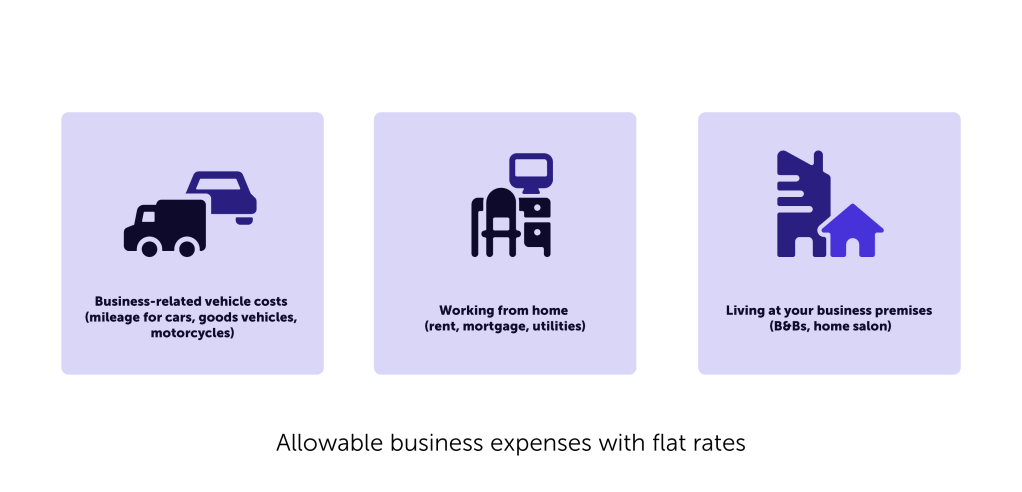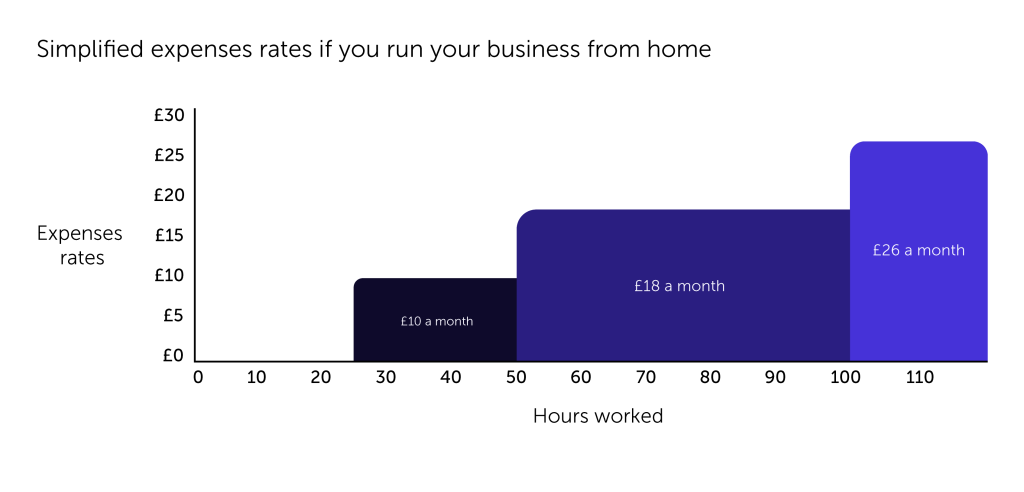Simplified expenses use flat rates to save the self-employed calculating actual business expenses when reporting tax to HMRC.
There’s no doubt that bookkeeping and accounting can be complicated when you work for yourself. HMRC’s simplified expenses set a flat rate to make the claiming process easier and quicker for small businesses to manage.
You can use simplified expenses for certain business costs to help ease the pain of filing your tax return. But what are simplified expenses, and who can use them?
- How to use flat rate simplified expenses
- Simplified expenses working from home
- Simplified expenses mileage rates
- Simplified expenses and living at your business premises
- Self Assessment allowable expenses
Simplified expenses – when and how to use HMRC flat rate expenses

Simplified expenses let the self-employed calculate some of their allowable business expenses based on flat rates set by HMRC. This is instead of working out your exact expenditure, which can be a complicated process.
The self-employed allowable expenses list using flat rates includes:
- business-related vehicle costs
- working from home
- costs if you live in your business premises
Simplified expenses may be suitable for those who have straightforward tax affairs and relatively few business expenses. It can also be useful if you drive a lot for your business.
However, it’s not the right option for everyone as calculating and reporting your actual outgoings may save you more money – check which expenses method is best for you on the government website.
For all other costs, other than those listed above, you’ll need to work out exactly how much you’ve spent.
Simplified expenses can only be used by:
- sole traders
- business partnerships in which none of the partners is a company
If you’re set up as a limited company, or a partnership involving a limited company, you can’t use simplified expenses.
Simplified expenses working from home
Running a business from home or freelancing from home can make calculating exact business expenses a challenge. This is because you’ll need to work out the proportion you use for business purposes – for example, the hours you work and rooms you use. This is because HMRC only lets you claim expenses that are directly related to your business.
With the simplified expenses scheme you can claim a flat rate allowance if you use your home as an office or workshop.
Using your home as an office
If you’ve made use of your home as an office for at least 25 hours a month, you can use this allowance for the following expenses:
- rent/mortgage
- utilities
- other similar costs
You can’t use it for internet or telephone expenses as you’ll need to work out the proportion used for business purposes.
The simplified expenses flat rate for business owners working from home is as follows:
| Hours of business usage | Flat rate each month |
| 25-50 | £10 |
| 51-100 | £18 |
| 101+ | £26 |
For example, you run a candle making business from your home and worked 30 hours each month for 10 months but you had a busier period in winter where you worked 55 hours for two months. Here’s how you’d work out your simplified expenses for your rent/mortgage and utilities costs while you run your business from home:
- 10 months x £10 = £100
- 2 months x £18 = £36
- Total you can claim = £136

Image credit: Simply Business
Simplified expenses mileage rates
If you use a vehicle for your business, you could claim simplified expenses rather than working out the exact cost of buying and running your vehicle. This also applies if you lease a company car.
HMRC mileage rates can be used for:
- cars (except for those specifically designed for commercial use, such as a black cab or a driving instructors’ dual control car)
- goods vehicles (such as vans)
- motorcycles
The simplified expenses scheme can’t be used for vehicle expenses if you’ve already claimed capital allowances, or if you’ve already included them as part of your business profits.
The simplified expenses mileage rates are:
| Vehicle type | Flat rate each mile |
| Cars and goods vehicles on the first 10,000 miles | 45p |
| Cars and goods vehicles over 10,000 miles | 25p |
| Motorcycles | 24p |
This rate only applies to the use of these vehicles.
It’s important to note that once you start claiming simplified expenses for your vehicle, you must continue to do so for as long as it’s being used for business purposes.
You don’t have to use flat rates for all of your vehicles. If you have multiple vehicles used for work, you might choose to use flat rates for some, and work out exact costs for others.
As with everything related to your business taxes, it’s important that you seek advice from a qualified accountant before making a decision.
Is there anything else you need to know about self-employed simplified expenses? Let us know in the comments.
Need some help with small business accounting?
- Self Assessment and tax resource
- Bookkeeping tips for small businesses
- HMRC late filing penalties
- What is business insurance?
Is your business insured?
We have 800,000 UK policies plus a 9/10 satisfaction score. Why not take a look at our expert business insurance options – including public liability insurance and professional indemnity – and run a quick quote to get started?
